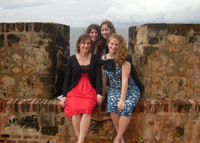
Like many good ideas, this one required some financial assistance to get off the ground… Maeve Raphelson ’10 and eight other Notre Dame students had been asked by friend and fellow senior Javier Soegaard to accompany him to Puerto Rico to work with some kids in a local school. Problem was, they couldn’t afford to make the trip.
So Raphelson came up with the idea of combining field research with the service work. “I proposed that we also try to do some research while there,” she says, “and we all applied for different sources of funding.”
For the senior in sociology, the most obvious source of help was the Margaret Eisch Endowment for Excellence in Sociology, which was established in 2008 by Joan and John Eisch in honor of their daughter Margaret, a Notre Dame major in sociology who died in 1976 during the summer between her junior and senior years. In addition to the department’s undergraduate research journal and the Margaret Eisch Memorial Prize, the endowment has in the last year also begun funding “unique and creative research projects” proposed by undergraduates like Raphelson.
With financial support from the endowment, Notre Dame’s Campus Ministry, and the Institute for Educational Initiatives, Raphelson, Soegaard, and the other students organized and led a two-day retreat with teens at the Academia del Perpetuo Socorro in San Juan.
“Our primary focus was to help with the spiritual lives of the students,” says Raphelson. “We presented [this trip] as a pilot program; it is our hope that in future years, Notre Dame students will go back and run retreats again.”
While on site, Raphelson also conducted research on how teens relate gender and religion. To prepare, she created an evaluation that incorporated questions relevant to her research and made plans on how to interview the students and lead small group discussions.
What she learned, in part, is that many teens are reticent even to talk about such topics, and this reticence appeared to be related to gender. “My evaluations gave some insight: the girls were much more talkative and open to talk about God, whereas the guys were more likely to speak about agnosticism or atheism,” she reports.
Despite the challenges that come with conducting research in the field, Raphelson was grateful for the chance both to serve the students and gain valuable research experience. “The Eisch Endowment gave me this great opportunity,” she says, adding that she has continued to combine these two interests through her senior thesis.
In this research project, Raphelson examines three prevalent perspectives on autism and then analyzes the writing of people on the autism spectrum as well as their parents to determine how or if their views fit within those perspectives.


